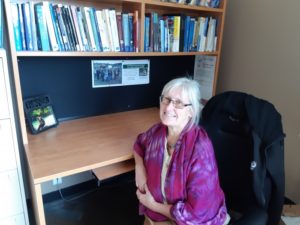Know Your Profs is an ongoing series of profiles on the instructors at Camosun College. Every issue we ask a different instructor at Camosun the same 10 questions in an attempt to get to know them a little better.
Do you have an instructor who you would like to see interviewed in the paper? Maybe you want to know more about one of your teachers, but you’re too busy, or just too shy, to ask? Email editor@nexusnewspaper.com and we’ll add your instructor to our list of teachers to talk to.
This issue we talked to Camosun Economics instructor Becky Mason about languages, landfills, and the duality of animal love.
1. What do you teach, and how long have you been at Camosun?
I started teaching at Camosun in 2008, after a career in international finance and then a career shift to teaching high school and sessional university courses along the US-Mexico border, before immigrating to Canada in 2005. Here, I teach Principles of Microeconomics, Principles of Macroeconomics, Fundamentals of Finance, Public Finance, and a variety of other Economics courses. I was one of the founding members of the college’s Environmental Sustainability Council and have integrated the environment into my courses wherever possible. This has included taking over 600 students to the Hartland Landfill over that time.

2. What do you personally get out of teaching?
Watching the future unfold. I feel privileged to be part of the journey for those who will take our society and our world into the next generations. It has been a pleasure to watch my students move on to better jobs and higher education, and to hear the progression of their life journeys as they complete their studies.
3. What’s one thing you wish your students knew about you?
I have been an international student myself. I have lived, worked, and studied in non-Anglophone countries (France, Tunisia, the Sudan), where my language skills were marginal upon my arrival, and I had to put in long hours to improve my language skills in order to succeed. The experiences I gained, especially becoming part of the lives of the local communities where I lived, have lasted a lifetime. Now I volunteer at the Intercultural Association of Victoria to maintain that sense of connection with the international community.
4. What is one thing you wish your students did not know about you?
Okay—many of my students know that I own a farm. Few know that some of the animals I raise there end up on my dinner table.
5. What’s the best thing that’s ever happened to you as a teacher here?
Hearing the feedback from my landfill tours. I know it must sound strange to go to a “dump” to learn about economics and business. The feedback has been 100 percent positive that seeing our waste problem in person changes how students approach their consumption choices and make a greater effort to not contribute to the problem.
6. What’s the worst thing that’s ever happened to you as a teacher here?
Ugh. I haven’t liked dismissing class early or cancelling altogether so that we can all get home safely in the snow.
7. What do you see in the future of post-secondary education?
Labour market forecasts for over a decade have been predicting the provincial labour shortage that we are now beginning to see. Post-secondary education will need to be accessible to people from all groups, including those traditionally underrepresented in higher education, in order to just keep pace with the workforce we have been accustomed to. If we do not succeed in this, our economy will shrink and the cost of living will rise even more.
8. What do you do to relax on the weekends?
Relax? I own a farm with a dog, cats, chickens, ducks, fish, and sheep that all must be tended to seven days a week! I do slip out to the beach now and then; I find peace in the ocean.
9. What’s your favourite meal?
I love Ethiopian food; I can eat it seven days a week. And then there’s chocolate… There is never enough chocolate…
10. What is your biggest pet peeve?
I find it very difficult to teach when students disrupt the class by loudly entering late or leaving early while the class is underway. I will stop the class until we can all focus on the learning. I think students that disrupt do not realize that their behaviour affects not only me but also the other students already present.
